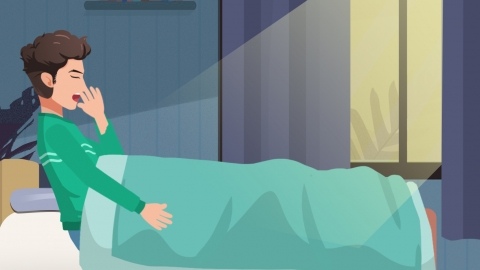What causes dizziness after waking up from sleep?
Generally, dizziness upon waking up may be caused by insufficient sleep, improper sleeping posture, rising too quickly, hypoglycemia, anemia, or other reasons. If discomfort occurs, it is recommended to seek medical attention promptly and undergo appropriate treatment under a doctor's guidance. Detailed analysis is as follows:

1. Insufficient Sleep
Long-term lack of sleep or poor sleep quality can lead to brain fatigue and affect normal brain function. When the brain does not get sufficient rest, symptoms such as dizziness upon waking may occur, possibly accompanied by fatigue, difficulty concentrating, and memory decline. It is recommended to ensure adequate sleep duration, improve sleep quality, and avoid frequent late nights.
2. Improper Sleeping Posture
Maintaining an incorrect sleeping posture for a prolonged period, especially neck twisting or compression, may affect cerebral blood supply and nerve conduction, thereby causing dizziness, possibly accompanied by neck discomfort, shoulder pain, and other symptoms. It is recommended to use a suitable pillow to support the neck, which helps improve blood circulation.
3. Rising Too Quickly
Quickly getting up from bed in the morning can cause blood to be unable to adapt to the change in body position immediately, resulting in reduced blood flow to the brain and causing transient hypotension, which leads to dizziness, possibly accompanied by visual darkening or a feeling of fainting. It is recommended to change positions slowly when getting up—sit up first, pause momentarily, and then stand.
4. Hypoglycemia
After a long period without food during the night, stored glycogen in the body is depleted, causing a drop in blood glucose levels and insufficient energy supply to the brain, which can cause dizziness, possibly accompanied by sweating, tremors, and intense hunger. It is recommended to include an appropriate amount of carbohydrates in breakfast to provide energy and follow medical advice for the use of medications such as glucose and sodium chloride injection, hydrocortisone tablets, and mannitol injection to alleviate symptoms.
5. Anemia
A deficiency in iron or other essential substances required for blood production can lead to anemia, which reduces the blood's ability to carry oxygen, causing insufficient oxygen supply to the brain. Especially during the transition from sleep to wakefulness, the brain's demand for oxygen increases, making dizziness more likely. It may also be accompanied by fatigue, pallor, palpitations, and other symptoms. It is recommended to follow a doctor's instructions for treatment with medications such as ferrous sulfate sustained-release tablets, ferrous fumarate tablets, and ammonium ferric citrate vitamin B1 syrup I.
It is also recommended to create a quiet, comfortable, dark, and temperature-appropriate sleeping environment, and to try to go to bed and wake up at the same time daily, which helps improve sleep quality.






